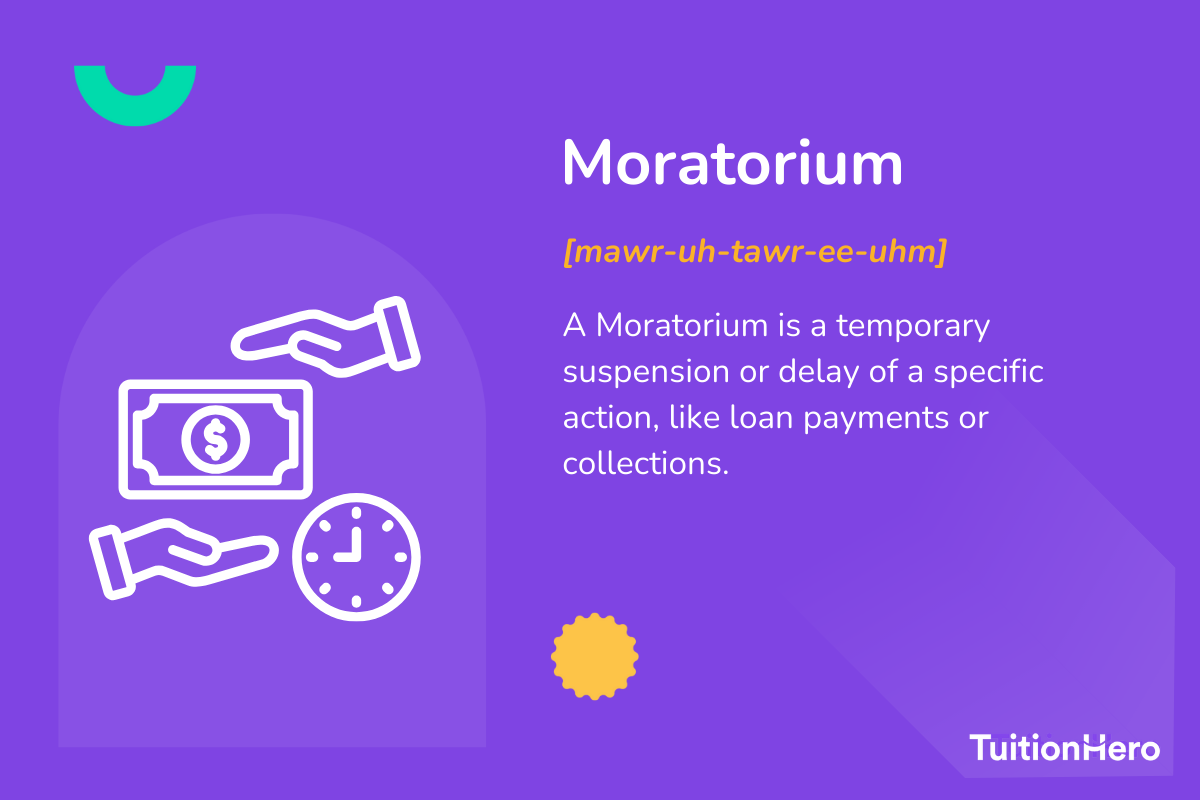Advertiser Disclosure
Last update: November 17, 2024
5 minutes read
What is a Moratorium for Student Loans?
Moratorium period explained: ease your student loan journey with this essential guide.

By Brian Flaherty, B.A. Economics
Edited by Rachel Lauren, B.A. in Business and Political Economy
Learn more about our editorial standards



By Brian Flaherty, B.A. Economics
Edited by Rachel Lauren, B.A. in Business and Political Economy
Learn more about our editorial standards
Planning to fund your education with a loan and worried about repayment right away? In certain cases, a moratorium period could be your safety net.
A moratorium period in education loans is a duration of time when you don't have to pay back the loan. You'll learn exactly what this period means, how it works, and the lifeline it could give you during economic downturns.

Key takeaways
- A moratorium period allows for a complete payment pause on your student loans
- During a moratorium, interest accrual is generally paused too, meaning you won’t see your balance increase
- A lender can declare a moratorium in response to a major economic event, while a grace period is a predetermined time before you must start making payments
What is a moratorium for student loans?
A moratorium for student loans is a pause button on your repayment schedule. It's a time period when you're not expected to pay back your loan, and interest will generally stop accruing.
A moratorium typically isn’t something you negotiate into your loan terms. Instead, it’s declared by a lender during exceptional circumstances. In the context of student loans, the Federal government issued a blanket moratorium on all payments and interest accrual in response to the COVID-19 pandemic.
This moratorium lasted for over three years, from March 2020 to September 2023. Today, payments have resumed and the moratorium is over. Barring another global economic event, it’s unlikely we’ll see another moratorium anytime soon.

What exactly is a moratorium period?
When you're dealing with student loans and money for school, a moratorium period is a financial break. It means you can stop repaying your loan while you're navigating challenging economic events, though you can make your payments if you want.
Unlike a grace period, there’s rarely a set period of time during which a moratorium will last. It’s important to pay attention to communication from your lender and servicer regarding any start and end dates for a moratorium.
How does the moratorium period benefit you?
During the moratorium, you can focus on your studies or work without worrying about paying down your loan. Here's a simple explanation of why this is good for you:
- Zero payment pressure: Until the moratorium ends, you're off the hook for monthly payments.
- Your credit stays intact: No payments during this period mean no dents on your credit score.
- Penalty-free: Forget about late fees or non-payment penalties during the moratorium.
Remember, since interest usually doesn’t accumulate during a moratorium, payments can go entirely toward the principal. Therefore, paying down your loan during a moratorium can have extra impact. When in doubt, TuitionHero.org experts are just a click away, ready to help you figure out your college finances.
What repayment options can you expect post-moratorium?
Once the moratorium ends and you have to start repaying your student loan, things pretty much go back to normal. In other words, don’t get used to the break - you’ll need to get back to making payments at some point.

TuitionHero Tip
Remember, if you’re having trouble making loan payments, stay proactive and communicate with your lender. It’s never a good idea to end payments without warning.
Can you extend the moratorium if you’re having trouble finding a job?
Remember, a moratorium is different from a grace period or a deferment. Depending on the terms of your loan, you might be able to extend these non-payment periods if you can’t find a job - but a moratorium is at the discretion of the lender.
How is a moratorium period different from a grace period?
Confusing a moratorium with a grace period is important to avoid. It's crucial to know the difference:
- Grace period: a shorter window that allows you some buffer between when you graduate and start earning money - if you don’t start making your payments by the end, you will be charged fees.
- Moratorium period: an extended timeframe where payments are paused, and interest typically doesn’t accrue.
Compare private student loans now
TuitionHero simplifies your student loan decision, with multiple top loans side-by-side.
Compare Rates
Do’s and don'ts of navigating a moratorium period
Knowing the right things to do and what to avoid during a moratorium period can seriously affect your financial situation after finishing school. It's important to understand this crucial time in your student loan experience. Below is a simple table that clearly shows what you should and shouldn't do.
Do
Do assess your financial status regularly.
Do start repaying interest early if possible.
Do contact your lender for any clarification.
Do check for possible extensions if necessary.
Don't
Don't ignore any potential accruing interest.
Don't miss any payments once the moratorium ends.
Don't avoid planning for repayment.
Don't treat the moratorium as a complete break.

Advantages and disadvantages of a student loan moratorium
A moratorium period for student loans has both positives and negatives. To make smart choices during your education, it's important to know about both and decide what works best for you.
- Gives you time to navigate a major economic downturn without worrying about repaying the loan.
- Lets you search for a job without the stress of immediate repayments.
- May improve your credit score by making timely repayments after the moratorium.
- Offers flexibility in financial planning, since it can increase the slack in your budget.
- Depending on the terms of the moratorium, interest might add up, increasing the total amount you owe on the loan.
- Poor management can lead to financial issues after graduation.
- If you're not smart with repayments, it can extend the time you're in debt.
- Starting repayments late may result in higher overall interest payments.

Why trust TuitionHero
At TuitionHero, we know that sorting out your college finances can feel overwhelming. That's why we're here to help with a range of services to make things easier.
Whether you're figuring out private student loans, looking for scholarships, dealing with FAFSA applications, or considering student loan refinancing, we've got your back to support your academic goals.
Understanding the moratorium period is important, and we're ready to help you make the most of it. Let's work together to create a solid financial plan for your future success, without any unnecessary financial issues.
Frequently asked questions (FAQ)
If you're having trouble starting your loan repayments after the moratorium period ends, you should talk to your lender right away to figure out solutions or extensions. Our team at TuitionHero can help you with strategies for this conversation and look into refinancing options to ease the pressure. Feel free to reach out to us for personalized advice.
Yes! If you can, start making payments during your moratorium period. It's a smart money move. Paying early can reduce the interest you have to pay when your regular payments kick in.
Typically, you can’t extend a moratorium period, which is decided by the lender. But if you need more time to get ready to make loan payments, discuss a deferment or grace period with your lender.
It usually won’t hurt your credit score, as long as you talk to your lender and agree on the extension. It's important to put any changes to your loan terms in writing to avoid any misunderstandings.
Final thoughts
Starting college is exciting, and knowing about the college finances can make it even better. When your student loan takes a break, it's not just a pause—it's a chance to plan for financial success after graduation.
Use this time wisely, and if things get tricky, TuitionHero is here to help guide you. For more advice and to learn more about making the most of your student loans, check out our financial education hub. Until then, stay on course and study smart!
Source
Author

Brian Flaherty
Brian is a graduate of the University of Virginia where he earned a B.A. in Economics. After graduation, Brian spent four years working at a wealth management firm advising high-net-worth investors and institutions. During his time there, he passed the rigorous Series 65 exam and rose to a high-level strategy position.
Editor

Rachel Lauren
Rachel Lauren is the co-founder and COO of Debbie, a tech startup that offers an app to help people pay off their credit card debt for good through rewards and behavioral psychology. She was previously a venture capital investor at BDMI, as well as an equity research analyst at Credit Suisse.
At TuitionHero, we're not just passionate about our work - we take immense pride in it. Our dedicated team of writers diligently follows strict editorial standards, ensuring that every piece of content we publish is accurate, current, and highly valuable. We don't just strive for quality; we aim for excellence.
Related posts
While you're at it, here are some other college finance-related blog posts you might be interested in.
Shop and compare student financing options - 100% free!

Always free, always fast
TuitionHero is 100% free to use. Here, you can instantly view and compare multiple top lenders side-by-side.

Won’t affect credit score
Don’t worry – checking your rates with TuitionHero never impacts your credit score!

Safe and secure
We take your information's security seriously. We apply industry best practices to ensure your data is safe.
Finished scrolling? Start saving & find your private student loan rate today





